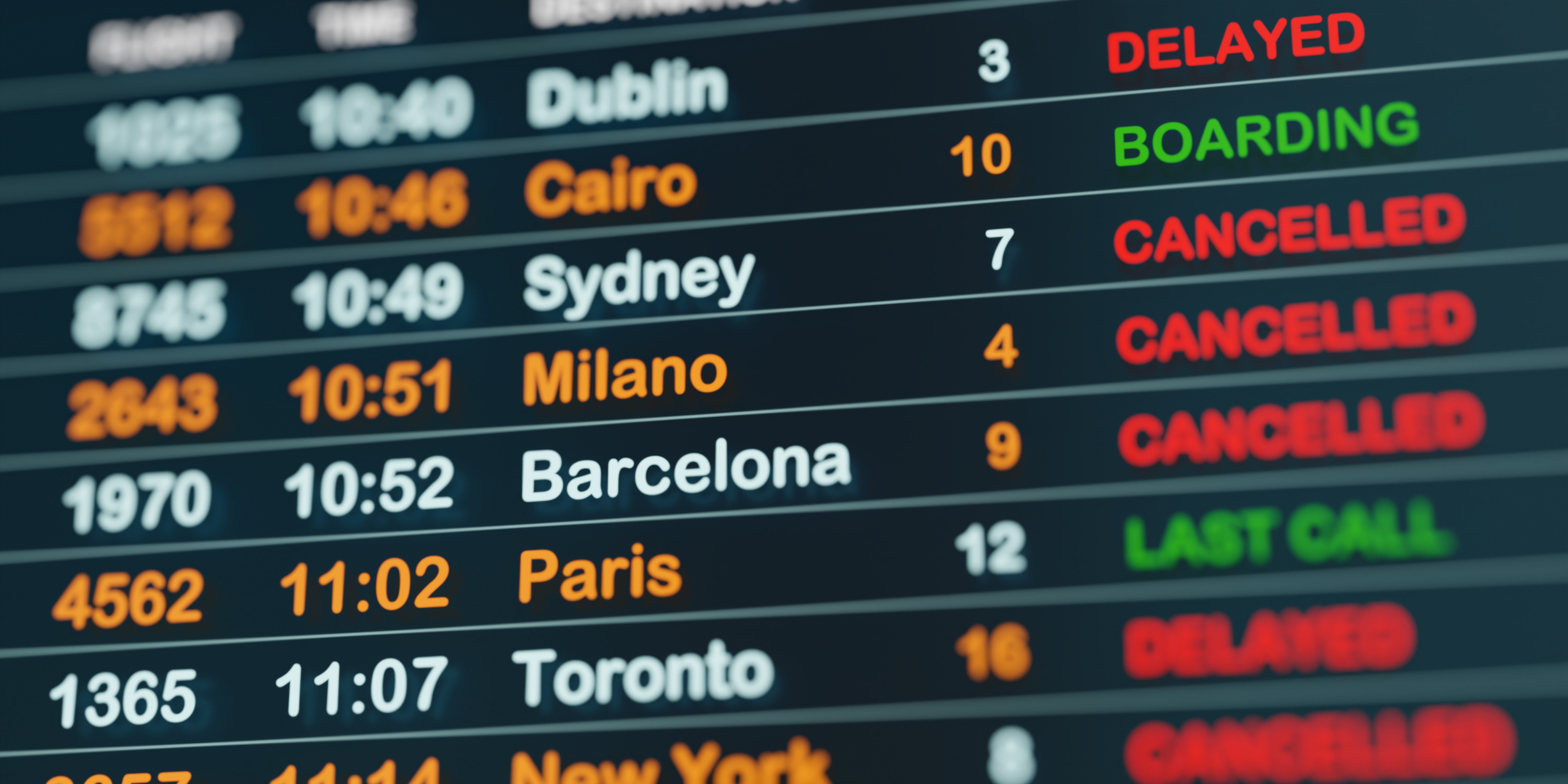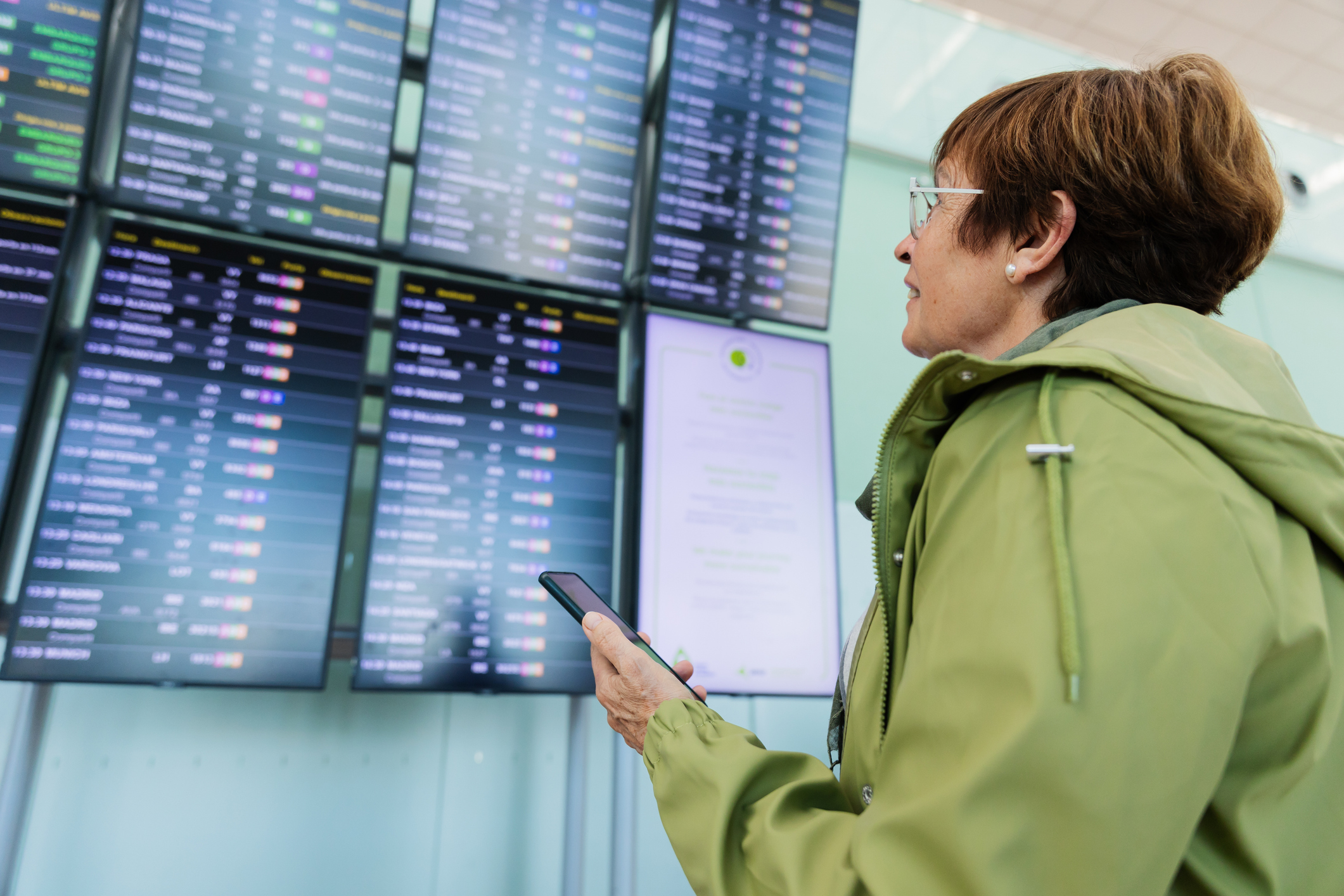Flight Refunds Could Soon Be Harder to Get
The Department of Transportation's deregulation efforts are taking aim at your rights to compensation for delays, canceled flights, lost baggage and more.


Profit and prosper with the best of Kiplinger's advice on investing, taxes, retirement, personal finance and much more. Delivered daily. Enter your email in the box and click Sign Me Up.
You are now subscribed
Your newsletter sign-up was successful
Want to add more newsletters?

Delivered daily
Kiplinger Today
Profit and prosper with the best of Kiplinger's advice on investing, taxes, retirement, personal finance and much more delivered daily. Smart money moves start here.

Sent five days a week
Kiplinger A Step Ahead
Get practical help to make better financial decisions in your everyday life, from spending to savings on top deals.

Delivered daily
Kiplinger Closing Bell
Get today's biggest financial and investing headlines delivered to your inbox every day the U.S. stock market is open.

Sent twice a week
Kiplinger Adviser Intel
Financial pros across the country share best practices and fresh tactics to preserve and grow your wealth.

Delivered weekly
Kiplinger Tax Tips
Trim your federal and state tax bills with practical tax-planning and tax-cutting strategies.

Sent twice a week
Kiplinger Retirement Tips
Your twice-a-week guide to planning and enjoying a financially secure and richly rewarding retirement

Sent bimonthly.
Kiplinger Adviser Angle
Insights for advisers, wealth managers and other financial professionals.

Sent twice a week
Kiplinger Investing Weekly
Your twice-a-week roundup of promising stocks, funds, companies and industries you should consider, ones you should avoid, and why.

Sent weekly for six weeks
Kiplinger Invest for Retirement
Your step-by-step six-part series on how to invest for retirement, from devising a successful strategy to exactly which investments to choose.
Last week, the Department of Transportation (DOT) shot down a proposed new rule that would have entitled travelers to compensation (on top of a refund) for flight delays or cancelations. That rule hadn't taken effect yet so travelers won't notice a difference on future trips.
But, you may need to brace for other changes in the coming months. Around the same time that the DOT announced that it was dropping that compensation rule, the agency issued additional notices stating that it would be reviewing existing consumer protection regulations. Depending on what the agency decides, the upcoming changes could make it harder to get a refund for a delayed or canceled flight.
While nothing is set in stone just yet, now is the time for travelers to prepare for a less regulated future of flying. That means knowing how your rights as a passenger may change and what steps you need to take to protect your upcoming travel plans.
From just $107.88 $24.99 for Kiplinger Personal Finance
Become a smarter, better informed investor. Subscribe from just $107.88 $24.99, plus get up to 4 Special Issues

Sign up for Kiplinger’s Free Newsletters
Profit and prosper with the best of expert advice on investing, taxes, retirement, personal finance and more - straight to your e-mail.
Profit and prosper with the best of expert advice - straight to your e-mail.
What rule did the Department of Transportation eliminate?

Last week, the DOT withdrew a Biden-era proposal that would have implemented a tiered cash compensation system for travelers whose flights are delayed or canceled. The rule, which hadn't taken effect yet, would have entitled you to an additional $200 to $775 in cash compensation on top of your refund, depending on the length of the delay and your destination.
It would have also guaranteed other incidentals like meals, lodging and transportation be provided during any delay or disruption to your flight.
Airlines and trade associations like Airlines for America have criticized the proposed rule, arguing that it would drive up ticket prices. But consumer advocate groups like Skycop and AirHelp told Travel Weekly that similar mandates in the European Union account for less than 1% of ticket prices for European consumers. If the mandate were implemented here, they estimate that ticket prices would go up no more than $1 per flight.
Pack your bags and earn rewards. Kiplinger chose the best travel rewards cards for airline, hotel and other perks to help you save money. Explore the top travel card picks. Advertising disclosure.
What other rules might be on the chopping block?
More Biden-era rules that had been implemented already are also up for review, according to other notices posted by the DOT last week. Some of the most notable consumer protections that could be rolled back in the coming months include:
- The criteria for which types of flight cancelations would entitle you to a ticket refund.
- The "meaning of timely bag delivery" on domestic and international flights, potentially impacting your rights to compensation and refunds as a result.
- Automatic refunds of fees for services that were not provided
- Mandated travel vouchers or credits for passengers who need to cancel or change their flight due to a serious communicable disease (e.g. - COVID-19).
- Fee disclosure requirements mandating airlines show you ancillary charges (like baggage fees) when searching for a flight so you'll know the full price of your flight upfront.
No decision has been made just yet about any of these. That means it's possible these protections could stay in place. It's also possible they could be changed in some way rather than scrapped entirely.
Right now, the tentative deadlines for the review process on the various rules are between February and May of next year. That means any trips planned before then will still be protected by the current rules. But any trips you have planned for next summer and beyond might be subject to new guidelines.
Your rights as a flyer right now

Until the DOT announces any changes, your guaranteed rights to a refund and other consumer protections are as follows:
- If an airline cancels your flight for any reason and you choose not to fly, you're entitled to a refund and airlines must notify you of your right to a refund.
- If your flight is changed or delayed by three hours or more (six hours or more for international flights) and you choose not to fly, you're entitled to a refund and airlines must notify you of your right to a refund.
- If an airline changes your arrival or departure airport or adds a connecting flight to your itinerary, these also constitute significant changes that would entitle you to a refund if you choose not to fly.
- If you were involuntarily downgraded to a lower seat class (such as being moved from first class to economy), you are entitled to a refund of the difference in fare prices.
- If you have a disability, you're entitled to a refund if a change in aircraft or a change in the flight itinerary would make accessibility features you need unavailable.
- If you paid for additional services like baggage fees, Wi-Fi or seat upgrades but weren't able to use those services because your flight was canceled, delayed or changed, you're entitled to a refund of those fees.
- If your bags were delayed by 12 hours or more (15 hours on international flights), you're entitled to a refund of any baggage fees you paid.
- When you are entitled to a refund, that refund must be made within seven business days of your request if you paid via credit card. If you paid by any other method, the timeframe is 20 calendar days.
- When you are entitled to a refund, you are allowed to refuse the offer of a travel voucher or credit and request a refund to your original payment method.
In addition, where the DOT doesn't guarantee refunds, it does hold airlines accountable for upholding their own policies. So, it's always a good idea to check the specific airline's policy and refunds and compensation ahead of a trip to find out what additional protections might apply to your flight.
If the airline is being difficult or reluctant to uphold its own policies, you can file a complaint with the DOT.
How to protect your trip if your passenger rights change
The DOT has not announced what, if any, changes it's making to the rights listed above. But if any of those rights are rolled back or removed, you'll need to find out what your new guarantees are. It's also still a good idea to review the airline's own policy on refunds and compensation.
Lastly, you should always book your flight with a credit card. Specifically, book it with a travel card as many of these will also offer complimentary trip protection of some kind. Many American Express cards, for example, come with free trip cancelation and interruption insurance.
If the card you booked with doesn't offer similar protections, look into travel insurance that can offer even more robust trip protections, including options like "cancel for any reason" coverage. That way, even if the airline won't refund you, your credit card or travel insurance provider will.
Related content
Profit and prosper with the best of Kiplinger's advice on investing, taxes, retirement, personal finance and much more. Delivered daily. Enter your email in the box and click Sign Me Up.

Rachael Green is a personal finance eCommerce writer specializing in insurance, travel, and credit cards. Before joining Kiplinger in 2025, she wrote blogs and whitepapers for financial advisors and reported on everything from the latest business news and investing trends to the best shopping deals. Her bylines have appeared in Benzinga, CBS News, Travel + Leisure, Bustle, and numerous other publications. A former digital nomad, Rachael lived in Lund, Vienna, and New York before settling down in Atlanta. She’s eager to share her tips for finding the best travel deals and navigating the logistics of managing money while living abroad. When she’s not researching the latest insurance trends or sharing the best credit card reward hacks, Rachael can be found traveling or working in her garden.
-
 Quiz: Do You Know How to Avoid the "Medigap Trap?"
Quiz: Do You Know How to Avoid the "Medigap Trap?"Quiz Test your basic knowledge of the "Medigap Trap" in our quick quiz.
-
 5 Top Tax-Efficient Mutual Funds for Smarter Investing
5 Top Tax-Efficient Mutual Funds for Smarter InvestingMutual funds are many things, but "tax-friendly" usually isn't one of them. These are the exceptions.
-
 AI Sparks Existential Crisis for Software Stocks
AI Sparks Existential Crisis for Software StocksThe Kiplinger Letter Fears that SaaS subscription software could be rendered obsolete by artificial intelligence make investors jittery.
-
 One of the Most Powerful Wealth-Building Moves a Woman Can Make: A Midcareer Pivot
One of the Most Powerful Wealth-Building Moves a Woman Can Make: A Midcareer PivotIf it feels like you can't sustain what you're doing for the next 20 years, it's time for an honest look at what's draining you and what energizes you.
-
 I'm a Wealth Adviser Obsessed With Mahjong: Here Are 8 Ways It Can Teach Us How to Manage Our Money
I'm a Wealth Adviser Obsessed With Mahjong: Here Are 8 Ways It Can Teach Us How to Manage Our MoneyThis increasingly popular Chinese game can teach us not only how to help manage our money but also how important it is to connect with other people.
-
 Looking for a Financial Book That Won't Put Your Young Adult to Sleep? This One Makes 'Cents'
Looking for a Financial Book That Won't Put Your Young Adult to Sleep? This One Makes 'Cents'"Wealth Your Way" by Cosmo DeStefano offers a highly accessible guide for young adults and their parents on building wealth through simple, consistent habits.
-
 My Spouse and I Are Saving Money for a Down Payment on a House. Which Savings Account is the Best Way to Reach Our Goal?
My Spouse and I Are Saving Money for a Down Payment on a House. Which Savings Account is the Best Way to Reach Our Goal?Learn how timing matters when it comes to choosing the right account.
-
 We're 78 and Want to Use Our 2026 RMD to Treat Our Kids and Grandkids to a Vacation. How Should We Approach This?
We're 78 and Want to Use Our 2026 RMD to Treat Our Kids and Grandkids to a Vacation. How Should We Approach This?An extended family vacation can be a fun and bonding experience if planned well. Here are tips from travel experts.
-
 My First $1 Million: Retired From Real Estate, 75, San Francisco
My First $1 Million: Retired From Real Estate, 75, San FranciscoEver wonder how someone who's made a million dollars or more did it? Kiplinger's My First $1 Million series uncovers the answers.
-
 To Love, Honor and Make Financial Decisions as Equal Partners
To Love, Honor and Make Financial Decisions as Equal PartnersEnsuring both partners are engaged in financial decisions isn't just about fairness — it's a risk-management strategy that protects against costly crises.
-
 Top 5 Career Lessons From the 2026 Winter Olympics (So Far)
Top 5 Career Lessons From the 2026 Winter Olympics (So Far)Five lessons to learn from the 2026 Winter Olympics for your career and finances.
